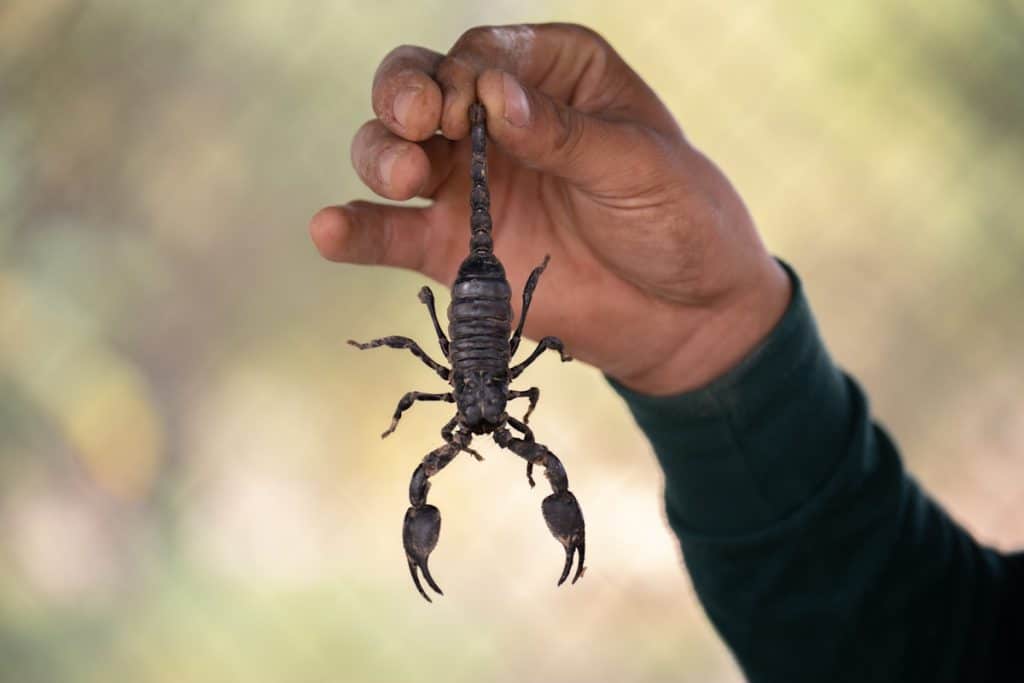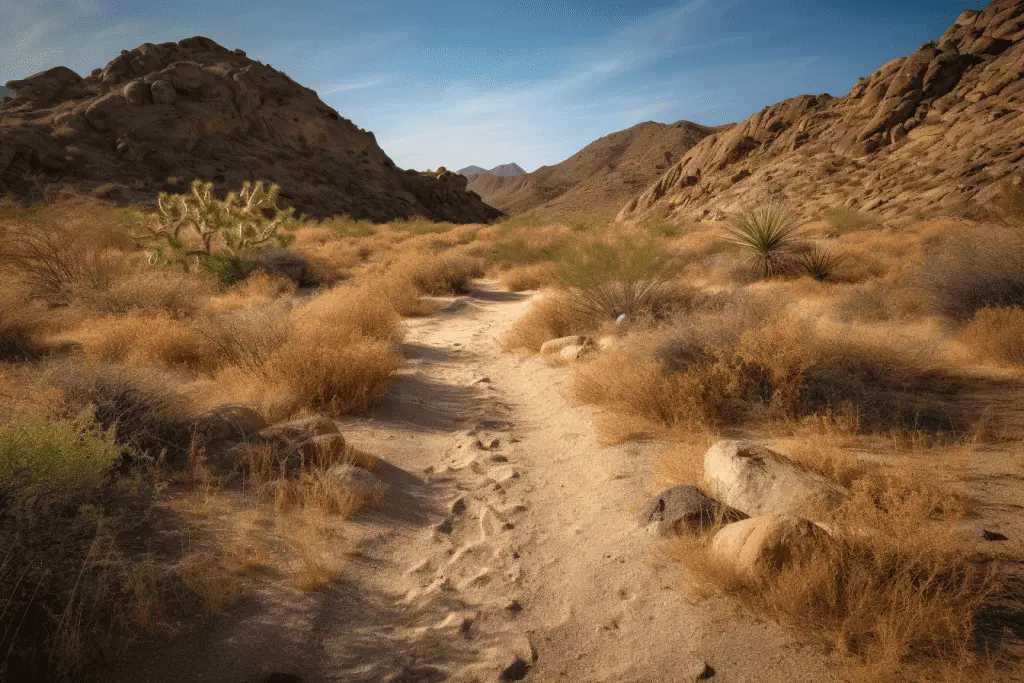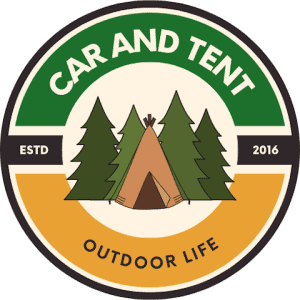Going camping in scorpion territory? Learn how to keep scorpions away while camping so that you won’t have any issues.
In this guide, we’re going to demystify scorpions, understand their behavior, and most importantly, learn a whole lot of practical tips to keep them at bay during your camping adventure. From selecting the perfect campsite to setting up your tent, and even what to do if you happen to get stung, we’ve got you covered. So, buckle up and let’s make your camping trip a scorpion-safe experience!

Get to Know Your Neighbor – Demystifying Scorpions
You’re getting ready for a fantastic camping trip, and the last thing you want is an unexpected encounter with a scorpion. To avoid this, the first step is understanding what we’re dealing with. So, let’s get the facts straight about these intriguing, yet often misunderstood creatures.
Scorpions are arachnids, related to spiders and ticks, with about 1,500 species found worldwide. Most species are harmless to humans, but there are a handful (like the Arizona bark scorpion) that can pack a punch with their sting. It’s important to remember though that scorpions are not naturally aggressive and typically only sting in self-defense.
They love to hide in dark, secluded areas, and are most active at night. During the day, they can be found under rocks, logs, or in the loose bark of trees. At night, they venture out to hunt for food. A scorpion’s diet mainly consists of insects, spiders, and sometimes small rodents or lizards.
Remember, scorpions are a crucial part of the ecosystem and they don’t seek to harm humans intentionally. By understanding their habits and behaviors, we can coexist peacefully during our camping adventures. In the following sections, we’ll learn more about how to keep these critters away from your campsite.
Packing Right – Your Scorpion-Proof Camping Gear
So, you’re set to hit the outdoors, but have you packed the right gear to keep those pesky scorpions at bay? Your first line of defense is your tent. A good quality tent with a sturdy, zipped entrance is crucial. This provides a solid barrier between you and any adventurous scorpions looking to explore.
Secondly, a UV or blacklight flashlight should be high on your packing list. Why? Well, scorpions have this really cool (or creepy, depending on how you look at it) feature. They glow under UV light. So, if you need to step out of your tent in the middle of the night, a quick sweep of your campsite with your UV flashlight will highlight any uninvited guests.
Picking a Scorpion-Free Campsite
When it comes to camping, not all spots are created equal, especially if you’re looking to avoid scorpions. Areas with large piles of rocks, wood, or heavy debris are a no-go. Scorpions adore these places as they provide excellent hideouts during the day.
Also, dense vegetation can harbor more than just scorpions, so it’s best to set up camp in a clear area. If you have a choice, aim for sandy or gravelly terrain. These aren’t ideal spots for scorpions to burrow and hide, making your campsite less appealing to them.
The Sweet Smell of Success – Using Natural Scorpion Repellents
Nature often provides solutions to its own challenges. Some essential oils, such as lavender and cedar, are known to deter scorpions. Try creating a natural barrier around your campsite by spraying these oils.
Alternatively, you could soak a few cotton balls in these oils and tuck them into your camping gear. However, keep in mind that while these scents can repel scorpions, they’re not foolproof. Always combine this strategy with other preventive measures for the best protection.
How to Set up a Scorpion-Free Tent
How you set up your tent can also play a role in keeping scorpions away. Start by giving your tent a good shake before setting it up. You don’t want to find a surprise guest who hitched a ride in your stored tent!
Once your tent is up, remember to keep the door zipped at all times when not in use. And don’t forget about your sleeping bags and backpacks. Keep them off the ground and sealed when you’re not using them. For added safety, consider sleeping on cots. They lift you off the ground and it’s less likely that scorpions will climb them.
Safeguarding Your Gear – Keeping Scorpions Out
Scorpions can crawl into just about any space, which means your open camping gear is an open invitation. Therefore, keeping everything sealed or closed when not in use is crucial. This applies to food containers, backpacks, clothing, and even shoes.
Speaking of shoes, get into the habit of shaking them out before putting them on. A shoe can make a cosy hiding place for a scorpion, and trust me, a scorpion in the shoe is the last surprise you want on your camping trip!
Meal Time Tactics – How to Store Food to Deter Scorpions
Okay, let’s talk food. We all love a good camping meal, but guess what? The scorpions are pretty interested in your grub too! Not necessarily for the same reasons though. It’s not your cooking they’re after – it’s the insects that your food might attract. Insects are a scorpion’s main diet, so the fewer bugs you attract to your campsite, the less attractive it becomes to scorpions.
So, what’s the plan? Well, you need to store food in airtight containers or resealable bags. The aim is to minimize odors that might attract insects. Remember to clean up immediately after meals, ensuring that no crumbs or scraps are left behind. If you can, store your food containers off the ground. This could be in your vehicle, or if that’s not possible, consider hanging your food from a tree.
One more thing, make sure your trash is sealed too! Leftover food or food packaging in the trash can attract bugs and, you guessed it, potentially scorpions. Ideally, trash should be stored the same way as your food – sealed, off the ground, and away from your sleeping area. The key here is to keep your campsite clean and free of any food smells to avoid a surprise scorpion visit.
Adventure Time – Exploring Scorpion Habitats Safely
You’re camping to enjoy nature, right? That means you’ll likely wander beyond your campsite for some exploring. Now, this could potentially bring you into scorpion habitats, but don’t worry, I’ve got you covered on how to stay safe.
First things first, always wear sturdy shoes and long pants when you’re exploring. Yes, it might be hot, but protective clothing can prevent a surprise sting if you accidentally step on or brush against a scorpion. Plus, it’s a good idea to carry your UV flashlight with you, especially if you’re hiking in the early morning or evening hours when scorpions are more active.

Be cautious around their favorite hangout spots, remember these? Areas with piles of rocks, wood, or other debris, and dense vegetation. If you’re turning over rocks or logs, use a stick or tool rather than your hands, and always step on the side of rocks or logs, not over them. Scorpions could be hiding on the other side.
And finally, remember that we are visitors in their home. Observe them from a distance, respect their space, and never try to handle a scorpion. Armed with knowledge and precaution, exploring scorpion habitats can be a fascinating part of your camping adventure.
What to Do If You Come Across a Scorpion
So, despite your best efforts, you’ve come face-to-face with a scorpion. Don’t panic! Remember, scorpions are more scared of you than you are of them. Their sting is primarily a defense mechanism.
If you find a scorpion near your campsite, don’t try to handle it with your bare hands. Instead, use a tool or stick to gently guide it away from your area. You could also use a long pair of tongs or a scorpion grabber if you happen to have one.
What if you spot a scorpion inside your tent or sleeping bag? Again, don’t panic. Slowly and carefully, use a tool to guide it into a container, and then cover the container. You can then safely release the scorpion at a safe distance from your campsite.
Remember, scorpions usually sting when they feel threatened. So, as long as you stay calm, act carefully, and give them a wide berth, encounters with scorpions should not pose a threat to your camping trip.
First Aid for Scorpion Stings
Despite all precautions, accidents can happen. So, what do you do if you or someone else gets stung by a scorpion? The first thing to remember is not to panic. According to the Cleveland Clinic, most scorpion stings, although painful, are not life-threatening.
Clean the sting area with soap and water as soon as possible. This helps prevent any possible infection. Apply a cold compress to the sting site to reduce swelling and numb the pain. Over-the-counter pain relievers and antihistamines can help manage the pain and itching.
It’s crucial to monitor the person stung for any severe reactions. Symptoms like difficulty breathing, rapid heart rate, muscle twitching, or weakness might indicate a severe reaction to the venom. If this happens, seek medical help immediately.
When you’re heading out camping in areas known for scorpions, it’s a good idea to learn where the nearest medical facilities are located. Remember, preparation is key, and knowing first aid steps can make all the difference.
Summing Things Up: The Do’s and Dont’s for Dealing With Scorpions
When it comes to dealing with scorpions during your camping trip, there are a few common mistakes to avoid. Let’s dive into the do’s and don’ts.
Do’s: Always check your shoes before putting them on – it’s a scorpion’s perfect hiding place. Make sure your tent is zipped up whenever you’re not using it. Store food and trash in airtight containers to avoid attracting insects, which in turn could attract scorpions. And remember to use your UV light to check your surroundings during the night.
Don’ts: Never try to handle a scorpion with your bare hands – if you need to move one, use a tool or stick. Don’t set up camp near piles of rocks, wood, or dense vegetation as these are favorite hideouts for scorpions. Don’t leave your camping gear and clothes scattered around – always store them properly and check them before use.
Remember, your camping experience doesn’t have to be marred by fear of scorpions. Understanding their behavior, respecting their space, and taking the right precautions will help you coexist peacefully with these intriguing creatures.
